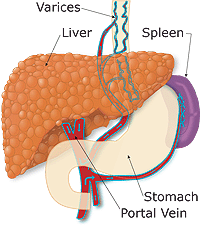for Veterans and the Public
What happens when you have cirrhosis? - Cirrhosis for Patients

Because the liver becomes lumpy and stiff in cirrhosis, blood cannot flow through it easily. Pressure builds up in the vein that brings blood to the liver. This vein is called the portal vein and portal hypertension is the name of the condition when the pressure in the portal vein is high. To relieve this pressure, the blood passes through other veins. Some of these veins, called varices, can be found in the tube that carries food from your mouth to your stomach (the esophagus) or in your stomach itself.
When you have cirrhosis, the high pressure in the portal vein backs up into another organ called the spleen. The spleen then gets big and destroys more platelets than usual. Platelets are blood particles that help with blood clotting.
When you have cirrhosis, blood flow to the liver is reduced. Substances such as ammonia that would normally be cleaned by the liver, escape into the general circulation. In addition to the problems with liver blood flow, when cirrhosis is advanced there aren’t enough healthy cells to get all the work done. These cells cannot make the good substances such as albumin and clotting factors that the liver normally makes. Cirrhosis can also affect the ability to tolerate certain medications, which can result in side effects even in normal doses (MEDICATION SAFETY GUIDE). Liver cancer, called hepatocellular carcinoma (HCC), can also occur when some of the sick liver cells start to multiply out of control.




















